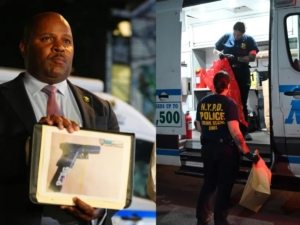President Donald Trump on Monday signed an order to send National Guard troops into Memphis. The decision intensifies his use of federal power to confront crime in U.S. cities.
With Tennessee Gov. Bill Lee in the Oval Office, Trump announced that Guard members would join a new task force combining federal agencies including the FBI, the DEA, Immigration and Customs Enforcement, and the U.S. Marshals Service. “This task force will be a replica of our extraordinarily successful efforts here,” Trump said, referring to Washington, D.C. “And, you’ll see it’s a lot of the same thing.”
The memorandum did not specify when troops would arrive or what form the expanded law enforcement presence would take. Lee’s spokesperson Elizabeth Lane Johnson said, “Planning is currently underway, and we will continue to work closely with federal and local partners to determine the most effective path forward.” The order also leaves open the possibility of help from neighboring states’ police or Guard units if needed.
READ ALSO: California’s attempt to halt Trump’s National Guard troop deployment hits judicial pause
Trump argued that the FBI’s increased work in Memphis had already reduced crime, but declared, “We’re sending in the big force now.” A White House post highlighted the city’s higher-than-average crime rate and claimed it had risen against national trends. Yet Memphis police reported that crime across all major categories was down in the first eight months of 2025, with overall levels at a 25-year low and homicides at their lowest in six years.
Even so, gun violence remains a persistent challenge. The city recorded more than 390 homicides in 2023, the deadliest year in its history. Lee welcomed the deployment, saying he was “tired of crime holding the great city of Memphis back.” Republican senators Marsha Blackburn and Bill Hagerty stood with him in support.
Mayor Paul Young, however, voiced opposition, noting Friday that he “did not ask for the National Guard, and I don’t think it’s the way to drive down crime.” Since the decision is final, he said he hopes to shape the Guard’s role to include duties such as traffic management, camera monitoring, or city beautification. Some local Democrats suggested exploring legal challenges, with Shelby County Court Clerk Tami Sawyer saying the city or county might sue.
Trump hinted that Chicago could be next on his list. “We’re going to be doing Chicago probably next,” he told reporters, though he suggested action there might not be immediate. Asked whether state or local resistance could block him, Trump responded, “It’s not going to matter to us at all. We hope we have the governor’s help. But, if we don’t we’re doing it without him.”
The president also raised the possibility of sending troops to other Democratic-led cities, mentioning New Orleans, Baltimore, and St. Louis. “We want to save these places,” Trump said.
READ ALSO: Chicago pushes back as Trump threatens to send National Guard










